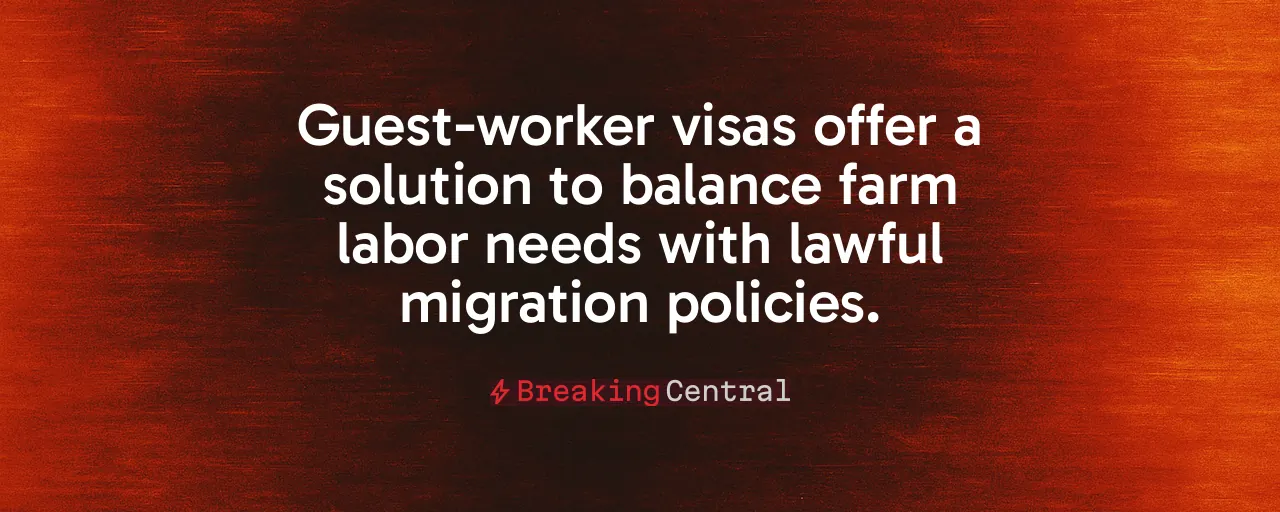A Community on Edge
Last month, federal immigration raids swept through California's Inland Empire, targeting undocumented workers in the heart of the state's agricultural belt. Families huddled in fear, and fields went unharvested. The First Partner of California visited a nonprofit in Perris to deliver food and hear stories of distress, spotlighting a crisis that has reignited a fierce national debate. But the real issue runs deeper than headlines suggest. It's about balancing the rule of law with the realities of a vital industry.
These raids, ordered by the Trump Administration, aim to enforce immigration laws that many argue have been ignored for too long. These raids have left farm owners scrambling and communities fractured. The question isn't just about enforcement; it's about what America stands for: fairness, security, and opportunity. How do we uphold laws while ensuring the system works for everyone? The answer lies in principles that prioritize sovereignty and economic strength.
The Cost of Chaos
California's farms produce a third of the nation's vegetables and two-thirds of its fruits and nuts. This doesn't happen without labor, much of it provided by undocumented workers. Recent raids have led to absenteeism rates as high as 70 percent in some fields, leaving crops to rot. University studies estimate a potential $275 billion hit to the state's economy if mass deportations continue. For a nation reliant on affordable food, this is a wake-up call.
But unchecked immigration has its own costs. Federal data shows millions of border encounters and visa overstays annually, straining public resources. In low-skill sectors like agriculture, undocumented labor can depress wages for American workers, particularly those struggling to make ends meet. Hospitals and schools bear the burden of uncompensated care and services, with taxpayers footing the bill. Ignoring these realities undermines fairness for citizens and legal immigrants alike.
Law as the Foundation
Immigration laws exist to protect national sovereignty and ensure orderly migration. Enforcing these laws provides clarity and protects national sovereignty. Workplace raids send a message: employers who hire undocumented workers face consequences. This deters illegal hiring and reduces the pull of unauthorized migration. Policies like mandatory E-Verify, which verifies workers' legal status, could streamline compliance and level the playing field for businesses.
California's sanctuary laws, however, complicate this. By limiting cooperation with federal agents, the state creates a patchwork of enforcement that confuses communities and emboldens lawbreakers. In 2018, the state doubled down on these policies, prioritizing local control over federal mandates. The result? A system where some are shielded from accountability, while others bear the cost. A unified approach, rooted in consistent enforcement, would restore trust and stability.
Families and Fairness
The human toll of raids is undeniable. Families, including those with legal status, live in fear of separation. Children miss school, and mental health struggles spike. Nonprofits report rising anxiety and even suicides among breadwinners unable to work. These stories demand compassion, but they also highlight the need for a system that prevents such chaos. A porous border and lax enforcement create the conditions for these crises.
Rather than subsidizing legal aid for undocumented residents, resources could prioritize citizens and veterans facing their own mental health challenges. Programs like California's youth behavioral health initiatives are laudable but stretched thin. Redirecting funds to those who've followed the law ensures fairness while addressing urgent needs. Compassion requires building a system that works for all, while also respecting boundaries.
A Smarter Path
Agriculture needs workers, and America needs secure borders. A modern guest-worker visa program offers a solution. Modeled on past reforms, it could provide legal pathways for seasonal farmworkers while requiring return to their home countries. This balances labor demands with enforcement, reducing reliance on undocumented labor. Bipartisan support for such visas exists, as seen in proposals dating back to the Reagan era.
Technology also holds promise. Grants for mechanization could help small farmers reduce labor costs, boosting efficiency. Strengthening E-Verify with faster, more accurate systems would curb illegal hiring without burdening businesses. These steps empower farmers, protect workers' wages, and respect the rule of law. They're not quick fixes, but they're grounded in reality.
Learning From the Past
History offers lessons. The 1986 Immigration Reform and Control Act legalized millions but failed to secure the border, leading to more illegal crossings. Raids in the early 2000s disrupted communities but didn't address root causes. Today's challenge requires blending enforcement with reform. Conservative states like Texas have pushed for local-federal partnerships, showing that cooperation can work. California's resistance, while principled to some, risks deepening division.
A nation that can't control its borders loses its ability to govern. Ignoring its economic needs, however, also courts disaster. Finding balance means enforcing laws while creating legal pathways for those who contribute. It's a tough road, but it's the only one that leads to lasting stability.
Restoring Order, Rebuilding Trust
The raids in California's fields are a symptom of a larger problem: a broken immigration system that serves no one. Farmers, workers, and taxpayers deserve better. Enforcing laws consistently, paired with targeted reforms like guest-worker visas, can restore order and fairness. The aim is to build a system that respects both the law and the people who live under it.
Communities need clarity, not chaos. By prioritizing legal pathways, supporting small farmers, and focusing resources on citizens, America can move forward. The alternative, endless raids or unchecked borders, erodes trust and prosperity. The path to a stronger nation starts with principled, practical solutions.
Every nation has the right to define its borders and protect its citizens. California's farms, and the families who work them, are part of that story. Let's write the next chapter with courage, compassion, and commitment to the rule of law.
